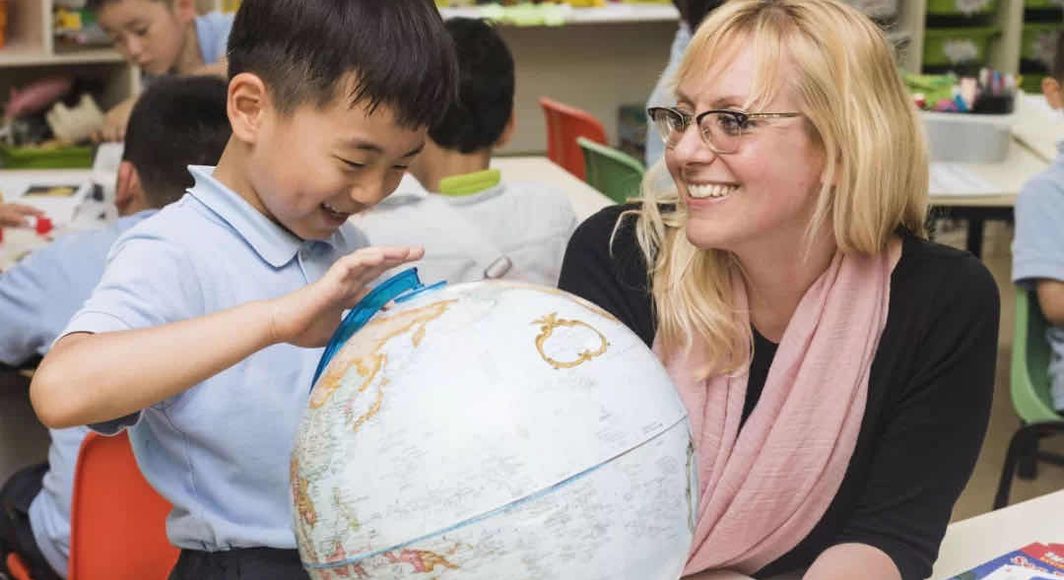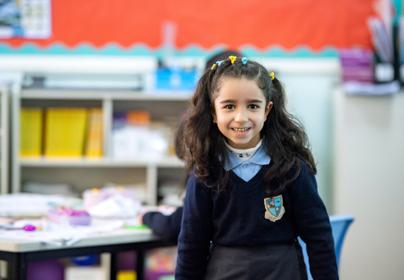Please briefly describe your journey to become a teacher.
I had the most wonderful journey to become a Primary Teacher and feel very fortunate. I started my career teaching young adults in the UK, specializing in Special Needs Education and then moved into Primary education; studying with Oxford Brookes University. I taught in a private school in Oxford and began teaching internationally over thirteen years ago in a British International school in Japan and have been in Shanghai with Britannica for three years.
What do you enjoy about being a teacher?
Teaching is a vocation and I am very grateful to have found a profession and role that I love and relish every day. Teaching is a great responsibility and it is an absolute privilege to be part of this profession.
Throughout my career, I have been fortunate to teach across all year groups in Primary. It has always been important to me to work with sensitivity, taking into account any educational and social needs and adapting my approach, so students can be immersed in the curriculum and school community. As an educator I have actively celebrated diversity as it has provided many new learning opportunities. I feel that it is fundamental that young learners see themselves as part of a wider global community that has the ability to exchange a wealth of information. A creative approach is essential to encourage and nurture skills of original thinking amongst our learners.
Additionally, I pay equal attention to working in a team and have a sense of collective responsibility. I believe it is imperative to hold outstanding team work attributes, while also contributing as an individual and thoroughly enjoy sharing best practice with colleagues and being part of a warm, learning community. It is important for teachers to become lifelong learners, acting as a role model to pupils.
How do you view the role of the teacher?
It is clear that the role of the teacher is multi-dimensional and the teacher must be able to understand and work with the holistic pupil to really nurture and develop not only their knowledge, but the deeper aspects of the children’s individual personalities, such as physical, social and emotional needs to support them to achieve.
I believe the classroom should embrace an ethos of joy, individualism, self-reflection, safety and tireless energy to achieve. Every child has the potential to contribute limitlessly to their environment if nurtured and supported throughout their learning journey. As a teacher, it is my responsibility to identify every ability within the class and ensure personal targets are set and achieved, as every journey begins with a small step.
There is nothing better than the creative buzz of a classroom, the electricity of thoughts and ideas and the knowledge that at the end of a school day you have contributed to positively affecting a young person’s future.

How does Britannica nurture its Students?
When I first joined Britannica, I was particularly taken by the school’s vision and ethos of promoting the academic, social and emotional wellbeing of its learners. The special nature and family-feel of the school stood out alongside the values of being inspiring, inclusive, collaborative and empowering. All are qualities which embrace what I believe to be important in an educational setting and what I would wish to continue to experience and learn from within my own career as a teacher.
I feel that it is fundamental that young learners see themselves as part of a wider global community that has the ability to exchange a wealth of information. A creative approach is essential to encourage and nurture skills of original thinking amongst our learners and this is clearly achieved within Britannica.
Tell us about your Maths Coordinator role.
I am currently the Primary Mathematics Coordinator and I believe that a fundamental aspect of my role is to help children to develop the skill of learning independently and to embrace the very concept of learning itself. Maths is meaningful on its own terms and we use it in everything we do.
I feel that it is important for children to embrace maths and break down misconceptions that we may have as adults that maths is only about numbers. It’s in the beautiful spiral of sea shell, the symmetry in the wings of a butterfly, the concentric circles of the ripples of water and the hexagons of a honey comb.
I have always been aware of my own needs as a learner and this has helped me to have an understanding of the different learning styles that exist in a group of students and particularly encouraged me to seek a position to develop Maths across the school. We ensure that the lessons are tailored to respond to the needs and abilities of all learners by adapting and differentiating my planning and selecting teaching resources carefully.
Moreover, I am always looking for ways to engage the students creatively through lessons and the learning environment to anchor enthusiasm and motivation to learn. This is a lifelong skill which underpins their future progress and should be introduced and nurtured from a young age.




